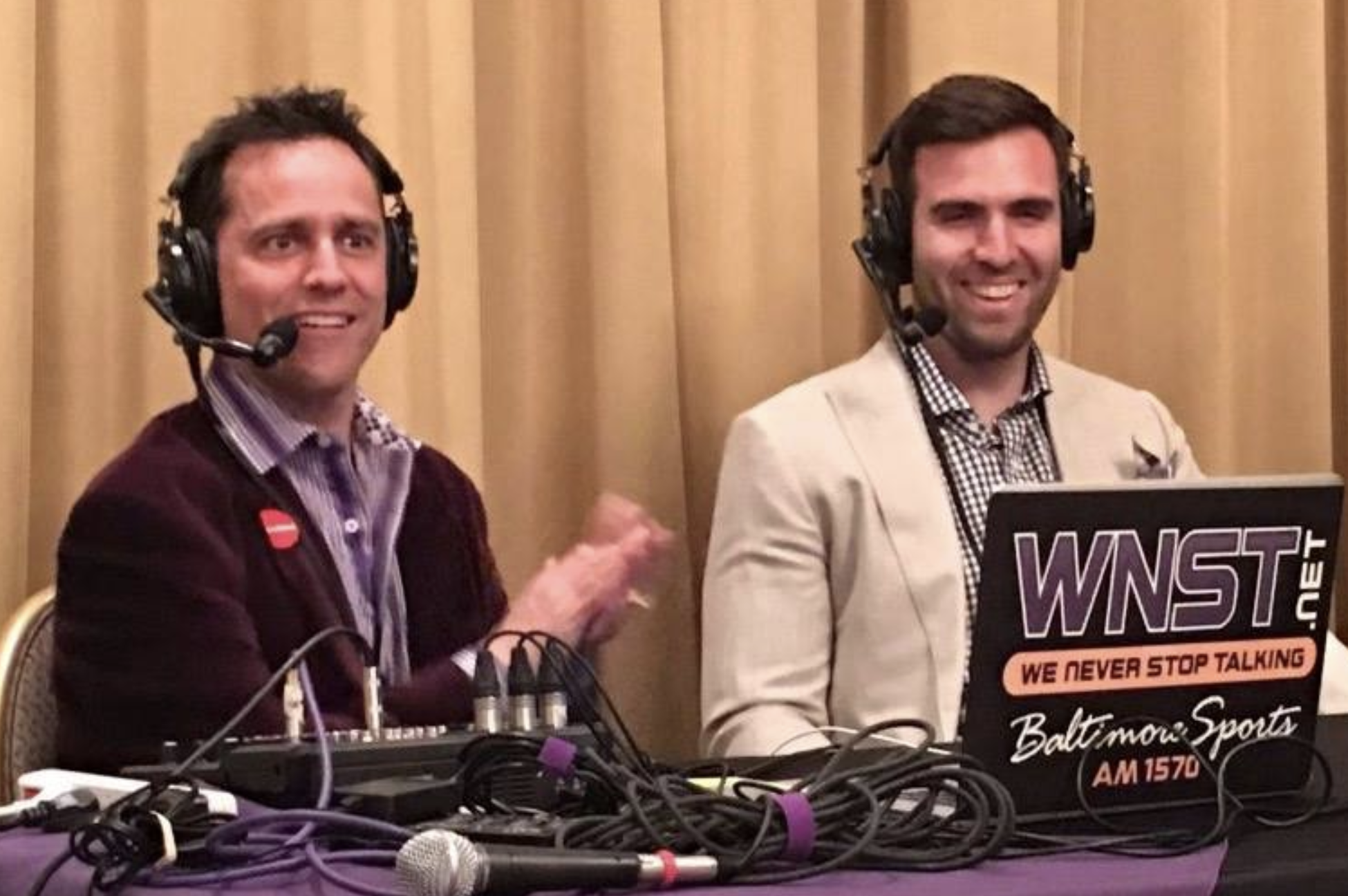“That’s just Joe being Joe! Joe is always gonna be Joe.”
– Ray Lewis (Nov. 2012)
THE TALLEST BUILDINGS IN THE skyline over downtown Philadelphia are vividly clear over the gridiron at Audubon High School. Not too far from this small town in New Jersey in the distance you can see the Comcast Center and One Liberty Place tower over Center City in the City of Brotherly Love. The white cement structure that serves as bleachers behind a tiny brick school façade can almost be confused for something from a movie set in 1950s Americana.
It was a field of dreams for Joe Flacco, but not necessarily a field of victories. Hop on the internet and take a look at the picture of his wife snapping him a bottle of champagne as if it were a football as part of their wedding album. She’s the center. His groomsmen are the linemen. Then you will understand this field and this scene. This is the place where Joe Flacco led the Audubon Green Wave to a 4-6 finish in his 2002 senior football season.
“We stunk,” says Flacco of his tiny high school with less than 100 in each graduating class. “It was a small school, and we were never really good, but we loved playing here. Football here was always fun because it was always with your friends and the kids you grew up with from the neighborhood.”
To understand and to fully appreciate Joe Flacco, you need to visit Audubon, New Jersey and see his view of the world as a Super Bowl MVP and Baltimore sports hero, where for months after the win storefronts still had homemade posters and window stickers celebrating their unlikely hometown champion.
“Where I live and where I’m from it’s right in the middle of the middle of all hardcore Philly sports fans,” Flacco said. “Philadelphia is in Pennsylvania, but the Jersey side is the heart of the fan base for all of the teams. It’s all Eagles, Phillies, Flyers, and Sixers here. It’s always been like that, and it’ll always be like that. I’ve been around crazy, passionate, vocal fans all my life.”
These Philadelphia natives are the same fans who are famous for once booing Santa Claus. Toughness kinda came with the turf for Joe Flacco.
His hometown doesn’t look quite like a scene from Rocky, like the west side of the Delaware River or Highlandtown in Baltimore with traditional East Coast row homes and narrow, one-way streets. It’s more like something from a John Mellencamp song, like “Small Town” or “Pink Houses.” It’s more Main Street USA with the very apparent stability of blue-collar family life and small ranch-style homes separated by modest yards, and picket fences. If it were Baltimore, it’d be Parkville or Catonsville – just closer to downtown.
Audubon High School is exactly six miles from the front gates of Lincoln Financial Field, where Flacco had his own rocky homecoming vs. the Eagles in a Ravens 24-23 loss in Week 2 of the 2012 season, his only chance in five years as Baltimore Ravens quarterback to play a regular season game just a long jog from his hometown.
In Audubon, Flacco is, well, just a regular Joe for the most part.
“It’s almost like a different life because I grew up around here. I’ve always been around here, and I hope it stays like this,” he said. “It’s my home. It’s where I want to be, close to my family. All of my family is here.”
Flacco’s ascension to Super Bowl MVP and World Champion reads straight from the library of the Horatio Alger catalog.
Son of a mortgage banker Steve Flacco and his wife, Karen, who were high school sweethearts, Joe is the oldest of six children – five boys and a girl. Flacco played three sports and loved all of them as long as he can remember. Despite his dad being just 5-foot-10, Joe went through a surprising and dramatic growth spurt in high school, sprouting more than six inches. His unusually strong arm caught the eye of a handful of college scouts. He went away to the University of Pittsburgh where his spirit was tested by not playing for almost three years and wound up 45 minutes south of Audubon in Newark, Delaware playing Division I-AA football and dreaming of a chance to play in the NFL.
Joe Flacco has always been an underdog, always been the guy who is counted out or not even given an opportunity. Perhaps he is such a risk taker because there’s never been much to lose?
If you marveled at his steely resolve in Super Bowl XLVII with the back shoulder pass to Anquan Boldin on 3rd & 1 with the game on the line then you’ll have to consider his long history of previous gambles, none bigger than walking away from a financial offer of a lifetime the previous summer.
In July 2012, after an unprecedented four consecutive trips to the postseason with victories each year and with Flacco headed into the final year of his initial five-year, $16 million deal, the Baltimore Ravens offered Joe Flacco a 5-year, $90 million extension to remain with and lead the club.
Flacco, knowing the Ravens had the hammer of a franchise tag and believing he could win the Super Bowl in New Orleans in February 2013, simply told owner Steve Bisciotti “no thanks.”
“I thought I was worth more and didn’t really see any circumstances where I wouldn’t end up getting paid more than what they were willing to give me at that point. It wasn’t like I was going to make any different salary last year than I was making already. I might have gotten some up-front money, but once I signed that deal, if I had played that deal out, then I was going to get the same amount last year that I got anyway. So, I figured play one more year and see what we can do as a football team, have confidence in myself, have confidence in the guys around me and just let it play itself out from there.”
What did he really have to lose, he thought, except some future money that he would never spend anyway and conceding that he wasn’t the “best” quarterback in the NFL but simply a very-well-paid one?
That was a concession that Flacco was absolutely not willing to make after going 4-for-4 in making the playoffs and winning games in January each year and narrowly missing a Super Bowl berth because of a dropped pass by Lee Evans and a missed field goal by Billy Cundiff in the 2012 AFC Championship Game. He was the best player on the field in the biggest game of the year, but his team lost.
As you would expect any agent representing his client, Joe Linta was very vocal in championing Flacco’s value during the initial 2012 negotiations, pointing out the many positive attributes of his client in the media.
“If winning matters then Joe Flacco is one of the top five quarterbacks in the NFL,” Linta said. “Anyone who watched film would say that. He’s an upper echelon guy. He’s not No. 10 and he’s not No. 1. If the Ravens didn’t think he was good, we wouldn’t be talking right now. They know he is good. They know he is the best guy they have ever had here.”
In the spring of 2012, following the gut-wrenching loss in Foxborough, Flacco appeared at a WNST.net live radio show in Perry Hall, Maryland as part of a charity event for the Living Classrooms Foundation and was asked about his contract status vs. his perception of his value.
Did Flacco think he was a Top 5 quarterback in the NFL?
“Without a doubt! What do you expect me to say?” Flacco said with almost nonchalance. “I would assume every quarterback in the NFL would say they are a Top 5 quarterback. I think I’m the best, I don’t think I’m Top 5. I don’t think I’d be very successful at my job if I didn’t feel that way. That’s not really too tough of a question. That doesn’t mean that’s the way it’s going to work out. But that’s the way I feel it is and that’s the way it should be.”
And if you ask anyone around him – from his parents to his friends, teammates, and agent – they’ll tell you the same thing. The negotiation wasn’t about the money for Flacco. And the statement wasn’t about bragging or being boastful because that’s not Flacco’s style.
“This is a guy who lived in his parents’ house in his childhood bedroom until his fourth year in the league,” his long-time agent Joe Linta said. “What people don’t know about Joe Flacco is his drive and desire to win a Super Bowl and take this team to the next level supersedes his desire for money. The guy is a very humble guy. He is a blue-collar guy. He doesn’t live high on the hog. He is a regular guy and the money is secondary to him to the winning and the success he enjoys with the team. Nobody can really understand that, but I have a lot of clients, and he is really unique in that perspective.”
It was about the principle for Flacco. And it was about what he had earned and his self-perceived market value, which is the only measurement that moves the needle for every quarterback in the NFL. Linta held Flacco’s hardline and never wavered in 2012:
“I can promise you if we do this deal today at lunch time Joe will be fine with it,” Linta said. “If we do this deal three years from now, Joe will be fine with it. I promise you that. He just wants to play the game and win. Obviously any human being wants to be recognized for what they are worth.”
And unlike many athletes – and even several of Flacco’s teammates – his contract was never discussed, and it never really came into any conversation during the 2012 season. There was no bellyaching or complaining in the media. And no one in the Ravens organization seemed to mind that he was motivated to win a Super Bowl to earn the extra money he wanted.
“One of his great attributes on the field is his calmness,” Linta said. “When I scouted him in college, one of the biggest things I noticed about him immediately was the highs weren’t gravely high and the lows weren’t low at all. He was the kind of guy if he threw three interceptions, he wouldn’t be fazed and he would go to the bench and would say, ‘Let’s throw the ball the next play.’ Nothing upsets him to the point where it deters his performance. That’s an amazing quality and one you really look for in a quarterback. As we scout quarterbacks in college he is sort of the poster child for that quality.”
In the end, Flacco never really came close to signing the deal. And once he said he thought he was the best and went into the 2012 season playing out his contract, Linta quickly came to his defense and made an almost irrefutable statement: “He thinks he is the best, and he wants to go out on the field now and prove it and earn it. Anybody that criticizes him for saying that is a fool.”
And Flacco bet on himself. He bet that he wouldn’t get injured. He bet that the team would make the playoffs and that his individual play wouldn’t slip or be hampered in any way in 2012. In reality, with $90 million on the table there was a long way to fall and a lot to risk with very little upside.
But, that was a risk Joe Flacco signed on for without much more than a blink.
“I’ve never been afraid to fail. I just don’t think like that. Why would you?” Flacco said.
“I think it was never more apparent than in the Super Bowl [XLVII] in the key moments,” his college head coach K.C. Keeler said after watching Flacco win the MVP honors of the game in New Orleans. “On the biggest plays of the game, [Colin] Kaepernick double clutched. And on 3rd & 1, Joe isn’t afraid of a fade route. Joe is not afraid to fail. He’s never been afraid to fail. And that’s such a great lesson for anyone in life: ‘Let it fly!’ And even after the victory and after signing the biggest contract in NFL history less than a month after the Super Bowl XLVII win, Flacco showed up for the press conference in jeans and a sweater and was captured ordering chicken nuggets at a fast food restaurant on his solo drive back to Audubon, an image that was shared on social media for all to see.
“I guess it was seen as a big risk,” Flacco said at his press conference after signing the new deal. “The real risk is that I could get hurt. I always kinda had faith that we were going to get something done here no matter what. I didn’t know if we were going to go win the Super Bowl and all of that, so that kind of helped the situation out, I think, a little bit.
“Listen, winning the Super Bowl, winning the Super Bowl MVP – it doesn’t make me as valuable as I am. I think I bring to the table what I bring to the table. I think I’m a valuable asset to this team, and I’m worth what I’m worth. The fact that we won the Super Bowl just comes with that. If we didn’t win the Super Bowl this year, I still think I’m worth the same, and I still think I’m the same person to this organization. It may not be seen that way, but that’s the bottom line. I still think I give the team the best chance to win moving forward – whether we won or lost this year. I think it makes it a little bit easier for [owner] Steve [Bisciotti] to reach into his pockets having said that we won the Super Bowl.
“And people don’t have to look at [Bisciotti] as crazy as they may have if he would have given me this much last year. That was my feeling all along. When guys that are drafted in the first round, when guys that win football games for you, quarterbacks like that, when the time comes up for those guys to get paid, they usually become the highest paid guy in the league. I’m sure a couple of months from now, someone is going to sign a deal, and you guys are going to be talking to them about how they are the highest paid guy in NFL history. That’s just the name of the game. I know that this isn’t going to hold up for that long, but that’s not a priority of mine to be the highest-paid guy. The priority of mine was to get that respect that I felt, that I feel now from this organization.”
To study his pathway to the confetti and the silver Lombardi Trophy, you need to go back to his upbringing, his family, and his resolve to try to become an NFL quarterback from the longest of odds.
“I didn’t play until I was in the seventh grade,” Flacco said. “I always knew I was going to play football, and my dad always told me I’d play. I started playing tee ball at 5 and football and basketball came at the same time when I got into middle school.”
As a pee-wee football player in Audubon, Flacco played every skill position except quarterback – running back, tight end, and mostly wide receiver.
“I knew I wanted to play quarterback,” he said. “I could always throw the ball and sometimes I’d throw some halfback passes.”
His family had a history with football. Both of his grandfathers graduated from nearby Camden Catholic and both played football on same team as part of the same graduating class. His mother and his wife’s mother graduated from Haddon Township, where his father Steve also attended and graduated a year after his mom. The three high schools are literally in adjoining towns where only a convenience store and a red light separates them by 3.7 miles.
Flacco attended Haviland Avenue School from kindergarten until the sixth grade and grew up practically next door, on a tree-lined street three blocks back into the neighborhood off the South White Horse Pike. He walked 12 blocks to Audubon High School.
Before getting married in June 2011, he had still left Baltimore at end of his first three aborted Super Bowl runs to return to his parents’ home to live in the offseason in his childhood second-floor bedroom with his brother, where the walls are still decorated with posters of Tom Brady, Joe Montana, Jerry Rice and Deion Sanders. His siblings used old Sports Illustrated posters as wallpaper for the modest home back when Joe was in high school.
So after beating Brady in the playoffs in January 2010, Flacco got to wake up to him every morning and see him on the bedroom wall winning a Super Bowl.
“Where else am I going to be getting taken care of like it’s home that’s better than home,” Flacco laughed. “My wife and I have been married two years now and we just won the Super Bowl, and we’ve had dinner at my parents’ house for 10 days in a row now. We have dinner at my Uncle’s house on Friday. I go over to my grandparents’ house on Sunday. My whole is life within these three miles.”
There are no new housing developments in Audubon and businesses rarely change. There are only the townships that are separated by stoplights and different tax pools and politicians.
“I haven’t been to too many places around the country like this one, essentially near a big city, where everyone knows everyone and it’s like a real community,” Flacco said. “I want my kid to grow up in this environment and have a normal childhood like I did. I don’t want him to grow up with the rich kids. I don’t want him to be a spoiled brat.”
Knowing that becoming the Super Bowl MVP changes things, he laughs and admits, “I know there’s going to have to be some work we’ll have to do as parents to fight that.”
But Flacco has clearly been well trained in parenting and inspired by his parents.
“My parents were really amazing,” Flacco said. “I’m so lucky. They instilled confidence in us, taught us about hard work. They taught us discipline. They’ve done a great job of being friends with us as we’ve grown up and have always made every one of us feel important.”
Flacco’s father loved sports and used sports in the old fashioned sense of teaching life lessons – practicing and playing hard and fair, accepting victory and defeat with dignity and being a good teammate.
“My Dad was never my coach on the field,” Flacco said. “He never coached, but he liked to give his thoughts and is still always trying to see what I see when I play.
“We grew up just having fun playing sports. We never did any camps or anything fancy. As a 13-year old kid we’d just go up to the park and play ball, shag flies, take batting practice and throw batting practice to each other. I’d play baseball all spring and summer, football in the fall, and shoot hoops in the winter when we had to go inside. Plus, my little brothers were always playing ball, too.”
At some point early in Joe’s high school life, and especially after the growth spurt, Steve Flacco thought: “These kids are pretty good at sports. Maybe there’s some scholarship potential?”
“Even when I was 10 years old I was good at sports,” Flacco said. “I never thought I couldn’t be in the NFL. But I think I had a legitimate reason to believe. I could look at other people and I knew that I threw the ball pretty well at every level and I could compete. I had that confidence that came from success. My brothers always had that instilled in us from our father. It wasn’t arrogance. We’re all pretty quiet people, with me being the quietest. My brothers are all more outgoing. I’m a little different than them.”
Joe has played the role of the quiet big brother all his life. He’s the oldest of six children — Mike, Stephanie, John, Brian and Tom are all staggered by two years behind his 1985 birth. Flacco outgrew his father in the eighth grade and was growing two inches a year in high school. At that point, Flacco was still as interested in baseball as he was football, playing the outfield and pitching each spring.
“I always wanted to be a baseball player or a football player,” he said. “I didn’t really like either one more. But I knew I wanted to do one of them. I’d like to think I could’ve at least played minor league baseball or maybe even more?”
Even long after it was clear that he was a football player – even as late as his junior year at Delaware – Flacco still had a serious passion for baseball.
“He came into my office after the season and told me he wanted to play baseball in the spring,” said his Delaware football head coach K.C. Keeler. “He really had no idea he would be a draft choice in the NFL. And I’m trying to explain to him that, ‘I think you can really do this. I think you can get drafted and play in the NFL.’ Honestly, Joe was shocked. He really wasn’t thinking that much about getting drafted and certainly didn’t think it’d be in the first round.”
“Yeah, K.C. wasn’t real keen on baseball,” Flacco said. “He wanted me to focus on football because he was adamant that I could be drafted. So I didn’t put up a fight.”
Four years earlier at Pitt, when he signed for the scholarship with head coach Walt Harris, it was understood that he wasn’t allowed to play baseball. But he was OK with that decision and excited to be headed to a big-time school to play quarterback. That was, until he never got a chance to play.
“Pitt was up and coming,” Flacco said. “They were Division I, they were in the Big East. Flying to Iowa didn’t really make sense for me and my family and Rutgers and Delaware didn’t seem as cool as going to Pitt did at the time.”
He redshirted at Pitt in 2003. He made it onto the field in three games in 2004 vs. Ohio, Nebraska, and South Florida, finishing the season with one completion for 11 yards. After the season Walt Harris was fired and Dave Wannstadt took over as head coach. Tyler Palko, who later played briefly with the Kansas City Chiefs and was in NFL camps with three other teams over five seasons, was ahead of Flacco on the quarterback depth chart and had just thrown for 3,000 yards for the Fiesta Bowl-bound Panthers, who finished the 2004 season at 8-4.
Wannstadt told Flacco in the early spring that he wasn’t going to start in the fall. He was going with Palko. “I went with Wannstadt through the spring and tried to feel him out to see where I stood,” Flacco said. “It was clear that I wasn’t going to get a chance to compete, so I did what I needed to do to have a chance at playing in the NFL. I needed to play.”
“Well, all I can tell you is that he definitely wasn’t just another guy,” said Arizona Cardinals wide receiver Larry Fitzgerald, who was at Pittsburgh for Flacco’s redshirt freshman season in 2003. “You knew he had all the intangibles to be a special player. He had the touch, the accuracy, and the arm strength. The only thing he didn’t have was experience.”
And to get that experience, he needed to get on the field and his clock was ticking. Flacco had visited with Keeler and Delaware in the spring of 2002 when the Blue Hens were the first (and only) team on his trail and wanting him to come 45 minutes south from Audubon to play.
“He came to our spring game during his junior year of high school,” Keeler said. “Here’s this tall, lanky guy and I was looking at parents and wondering if he was adopted. His dad was 5-10 and his mom is 5-7 and he’s towering over them.
“We recruited him out of high school all way to the end. He actually sat in my office after the spring game with his whole family. I mean here is this quiet kid whose family is just so important to him and you see it right away. We had to bring some extra chairs into the room because all of his siblings were with him and his parents that day. We were very close to getting him but we lost him. Once the Pitts and Rutgers and Iowas of the world started calling, he decided he wanted to play in Division I football, which is not unusual.”
Keeler was crushed when the big schools discovered Flacco during his senior year. Two years later, Flacco was trying to escape Pittsburgh and made Keeler his first phone call.
“I think he figured that when he knew he was leaving Pitt, why look around?” Keeler said. “He wanted an opportunity to compete. I wound up having the best scout team quarterback at any level in the country for a season.”
Flacco went to work on his accounting degree in Newark and bided his time waiting, while paying the $30,000 annual out-of-state tuition at Delaware in 2005. It was a long year on the sideline.
When he finally made it to the field in the fall of 2006, he was rusty. It had been almost four years since he was on the field in a competitive environment, taking snaps as a starting quarterback and all of his real experience was playing at a small New Jersey high school on a sub-.500 team. He clearly had all of the skills and more expertise from watching and perceptual learning but the live bullets were a challenge in the early going at Delaware.
“The more he played, the better he got,” Keeler said.
But it wasn’t easy, and it didn’t come without some disturbing growing pains for Keeler, Flacco, and the Blue Hens.
Delaware steamrolled tiny West Chester in his debut, 30-7, as Flacco was 9-for-18 with 110 yards and two TDs. But the following week, his college career at Division I-AA nearly came to a screeching halt after a poor performance vs. Albany in an ugly 17-10 loss when the Blue Hens entered the game as the No. 11 team in the country.
“Yeah, Joe was really struggling,” Keeler said. “I mean if you look at that play-by-play sheet it was like 3 and punt, 3 and punt, 3 and punt, 3 and punt, and he was struggling. I said something to my offensive coordinator Kirk Ciarrocca. I said, ‘What do you think? I mean the back-up is a capable kid.’ It was at the half, we’re down 17-3. Our backup was a team captain, Ryan Carty, who’s now the offensive coordinator up at New Hampshire, and Kirk said, ‘Let’s just get through this game.’ He said, ‘I think it’s worth it. This kid has too much ability. Let’s not set him back at all.’
“I think Joe would have managed his way through that setback, but Kirk made a great call. He said, ‘I don’t think it’s worth it. I think this guy’s upside is just too great to damage him even a little bit,’ and so we went with him and we lost that ball game.
“You could see him start to develop and you have to remember this was the second game for a kid from a very small high school in New Jersey, and I mean a very small high school football program. Then he sits two years at Pitt and he’s a practice quarterback at Delaware. He didn’t play a lot of football, and then finally he’s playing and he had to deal with some adversity and growing pains. But he was a guy who could handle adversity, and he’d just battle and improve. I think the single most important thing we did for him is give him an opportunity to play. The more he played, the better he got, and the rest is history.”
It was at Delaware that Flacco began to develop his skills as a signal caller and leader. Keeler and Ciarrocca installed a no-huddle offense and a series of complex pro-style calls and protections. Flacco, forever the student, always wanted more plays to install.
“His IQ is high,” Keeler said. “He was quick to learn everything. He loves the no-huddle, and I really think it helped him because it forced him to be more assertive. He’s a laid back guy by nature and in that offense he has to take charge, yell a lot and be in command. It allowed him to lead.”
The Blue Hens were a disappointment in 2006, finishing 5-6 and just 3-5 in the Atlantic 10 conference.
In the midst of all of the Ravens’ scouting of Flacco during the fall of 2007, the Blue Hens excelled on the field in his senior season. They marched through a trio of playoff wins after Thanksgiving against three of the top 10 teams in the country before losing to Appalachian State in the NCAA FCS Championship in Chattanooga just 11 days before Christmas. Flacco was 23-of-48 for 334 yards and a TD in the title game, but the Blue Hens defense allowed Appalachian State a whopping 358 rushing yards.
After a skills competition, the Indianapolis combine, plus Pro Days, and NFL facility visits, Flacco was still unsure of where he’d be drafted in April 2008. On draft day, he was insistent that he didn’t want anyone at the family home because he was concerned that he might slip down the board. “By then everyone was telling me I’d go in the second or third round, but you never know what to believe,” said Flacco, who had watched enough NFL Draft coverage in his life to know what a lonely soul Aaron Rodgers was in 2005 and Brady Quinn in 2007. He didn’t want to be “that” guy.
In the end, there were 70 friends and family at the Flacco home and ESPN kept requesting a chance to be there for the magic moment. “They talked me into it,” Flacco said. “In the end, I’m glad I let them come, but I was a little nervous and there was so much buzz around the whole thing where I live.”
When the Ravens traded back from No. 8 to No. 26, Flacco sensed that was a good sign because he really wanted to be drafted by Ozzie Newsome and Baltimore. “I definitely had a good feeling about everything that happened when I visited,” he said. “But you never really know. And all of a sudden I had a call from a 410 area code and it was Ozzie. The trade back to No. 18 popped up on the screen, and I was a Raven. It all happened really quickly, and I couldn’t even hear on the phone because everyone in my house was screaming once it hit the TV.”
“I’ve often said that I think Baltimore was the single best pick for him in terms of success,” Keeler said. “Going to be a Cowboy or a Charger or be a Packer — I just don’t know if he would fit in those places because it’s just too far away from home, and he’s used to going out to dinner with the family after a game. He’s used to that constant contact from his family. He’s a unique individual.”
“Kirk [Ciarrocca] would always say he doesn’t make the same mistake twice. Once he made any mistake, he really learned from it. The thing about Joe that makes him so special is that he’s not afraid to fail. I sat with Joe just before he got drafted by the Ravens, and I said, ‘Someday I am going to talk to a youth group and you need to tell me what I’m going to say about you, what made you special?’
“He said, ‘Um. I guess it’s that I’m not afraid to fail’ and it’s very true. That came athletically from his parents. We will take a small bit of the credit from Delaware but only about 10 percent of it, though. His parents did such a great job at raising him. I mean think about it — here is a guy who is a multi-millionaire in the NFL that comes back and lives in the family rancher in Audubon, New Jersey in the off-season and shares a room with his brother with a Tom Brady poster on the wall.”
Now, in the afterglow of five seasons of making the postseason – and twice knocking Brady out of the playoffs — plus a Super Bowl title and MVP honor, he’s still digesting what all that this newfound stardom and fame means. He was a kid with posters on the wall who idolized players like Joe Montana and Jerry Rice, but was never an autograph seeker or a fan of any specific team other than the 49ers. He and Ray Lewis shared that in common — they both grew up as big San Francisco 49ers fans.
“When I was playing whiffle ball as a kid, I never tried to mimic anyone,” Flacco said. “As a I kid I never got an autograph. I was never at the stadium to try to even get an autograph. We’d go to a Phillies game once in a while, and I only ever went to one Eagles game, when I was 12. My brother Mike was in the Punt, Pass & Kick competition, and he got to do it on the field at an Eagles-Cardinals game back when Rodney Peete was the quarterback.”
That was December 13, 1998. John Harbaugh was 13 years into his first year as the special teams coordinator of the Philadelphia Eagles.
So the closest Flacco ever came to touching an NFL quarterback was when he was 12 years old watching his brother from the sidelines. That same year his Ravens head coach John Harbaugh was watching his brother from the sidelines, too, as Jim Harbaugh was the quarterback of the Baltimore Ravens. Little did Flacco and Harbaugh know that they were together that day, at Veterans Stadium, on the same field at the same time and would win the Super Bowl together nearly 15 years later.
As much as he’s Harbaugh’s quarterback, the fact that Flacco is in Baltimore is more of a testament to Cam Cameron, who was Joe’s biggest champion and supporter during the draft phase. But it was Harbaugh, as a rookie head coach, who set the tone for Flacco as a rookie quarterback to thrive and to get on the field.
“I love John,” Flacco said. “Our relationship and the trust have grown a lot. He’s been a very consistent guy, and we’ve learned a lot about each other over the first five years.”
As Harbaugh admitted, it wasn’t easy in the beginning with the roster he inherited and the split factions in the locker room in 2008. Flacco had the same situation, coming into the Westminster training camp as the No. 1 draft pick, but really wasn’t expected to start the season under center as a rookie. There was a healthy competition underway during the summer between him, former No. 1 pick Kyle Boller, and former Heisman Trophy winner Troy Smith.
Boller was in position to be the starter until he suffered a partially torn labrum in his throwing shoulder in the third preseason game against Minnesota. Smith, on the eve of starting the third preseason game in St. Louis on August 23 and winning the starting job for 2008, became ill with a rare disease called Lemierre’s syndrome. Suddenly, Flacco was thrust into duty vs. the Rams on short notice. Five days later he started against the Atlanta Falcons and never looked back, a modern day Wally Pipp fairy tale. He has started every game since.
That 2008 training camp was an adjustment for everyone in the world of John Harbaugh. From the first day in the heat of Westminster in August, it was clear that there were new rules, new quirks, new wrinkles, new standards and a different way of doing things.
“When we were working harder in training camp then they were used to there were some negative attitudes from some of the veterans,” Flacco said. “It’s Year One for me, so he’s the only head coach I ever really knew. I didn’t know any better or care. But there were a bunch of pro-Billick guys who didn’t necessarily see John in a good light. But I guess that’s natural because a lot of people liked Brian.”
“Some of them misunderstood him working us hard. They’re thinking, ‘This guy is killing us.’” Flacco said. “But John actually thought that was best for the team. He always wants to do what’s best. And even though we don’t always agree with him, he’s coming from a good place. But everyone had to learn to trust each other and feel each other out.”
John wanted to show he was a tough guy. That’s the Harbaugh thing, the edge that he brought, and it rubbed some people the wrong way.
“In the end, you understand it, respect it, and buy in or you aren’t going to be here,” said Flacco, who thinks that Harbaugh has adjusted over the first five seasons and has included the players more in the equation for feedback. “He comes and tells you, ‘Here’s what we’re going to do? What do you guys think?’ He’s always taking a lot of our input, and he puts it into our practices. It wasn’t like that in the beginning, but it really evolved as the relationships grew.”
Since the 2008 season, Flacco has become a key part of the Ravens’ leadership council, who along with nine other key players and Harbaugh go over schedule, process, and some decisions within the team. It’s a chance for players to give feedback in a more relaxed setting so Harbaugh has a feel for what’s really happening.
“Early on you might see John as a hard ass and then you actually get to know him and see him in a relaxed state,” Flacco said. “He’s a guy who wants to do what’s best for the football team. It’s a tough job, balancing your job between being the head coach and setting rules, and giving players freedom to do what’s best for their body and trusting them. It’s a balance.”
Flacco came into a situation where the defense had literally pushed the offense around for more than a decade. And there wasn’t an established leader on the offensive side of the ball because the team never had a quarterback for more than what felt like one season. Despite Billick’s desire to have “explosives” and “verticals” in the Ravens’ attack, without a quarterback his plays would fall flat or be dumped into the flat by the likes of Stoney Case, Anthony Wright, Chris Redman, and Kyle Boller, who were all overmatched.
Flacco walked into a locker room where all of the money was on the defensive side of the ball and where the offensive side lost its anchor and Godfather in Jon Ogden. He became fast friends with veteran tight end Todd Heap and bonded with the receiving corps and Derrick Mason, who he was throwing passes to after practice, but the Ray Lewis-Ed Reed-Terrell Suggs circle was a difficult one to penetrate for any young player, let alone a Blue Hen from Division I-AA.
After the massive failure of Kyle Boller, he had to prove himself. Just seven weeks into the 2008 season, Suggs went on an Atlanta radio show and said that Troy Smith should be the starter.
For Flacco, it’s all just static.
“Honestly, I was confortable right away,” Flacco said. “We’ve all been a freshman in high school so you know that feeling of being the new guy. You have to prove to these guys that you can help them win. But it’s the NFL. You’re always thinking, ‘Can I do this?’ It can be intimidating if you allow it to be. I think of it as more of a challenge.”
Like every new and young member of the Baltimore Ravens, Flacco also remembers his first encounter with Ray Lewis.
“I’m not going to lie and say it wasn’t strange to walk into the building and see Ray Lewis hanging in the hot tub the first time,” Flacco said. “He said, ‘Hey Flac, how ya doing?’ and shook my hand.
“Of course, I’m like, ‘Holy shit, that was Ray Lewis!’”
Flacco had watched Hard Knocks from the summer of 2001 and the portrayal of most of that show was of a loose bunch of pranksters and intimidating veterans hazing rookies. As the No. 1 pick, Flacco was concerned.
“It’s hard enough to try to learn the system and play football without dealing with all of the stupid shit,” said Flacco, who admits that he’d rather be tied to a goal post than to sing in front of the team. “I thought they’d be crushing the rookie quarterback with having to take everyone to dinner for fifty grand, but I was never hazed. It was a different kind of mindset where John wanted to make guys comfortable so we could play good football together.”
From the beginning, and especially once the veteran defensive players saw his rare talent, Flacco says he was readily accepted.
“There’s no other job like being in an NFL locker room,” Flacco said. “We have every race, religion – every walk of life – every social class in America, in our locker room. It’s all different backgrounds, colleges, salaries, parenting – the whole thing. But we’re all working toward the same thing.
“I am who I am and I wasn’t going to put on any airs or be different than I was at Delaware. But when you get to know football players, you realize how similar you all are and that you’re all there to try to win a championship and be the best you can be.”
On the field, the offense was a work in progress in 2008 and Flacco didn’t have the most solid corps of receivers with only Derrick Mason and Todd Heap, returning from an injury plagued previous season, as seasoned players and Willis McGahee as the primary running back. The team, “Flacco’s team,” rebounded from a three-game losing skid that bottomed out with a brutal 31-3 loss in Indianapolis in October to finish 11-5 and rolled through a pair of road playoff wins in Miami and Tennessee.
Suddenly, the Ravens and Flacco were headed to Pittsburgh for the AFC Championship Game. No stranger to Heinz Field at this point, where he watched a lot of Pitt Panthers football as a backup quarterback, Flacco had a chance to drive the Ravens down the field in the fourth quarter to lead the club to a Super Bowl as a rookie.
The Steelers had beaten the Ravens twice in the regular season, once in overtime, 23-20, in September and again in Baltimore, 13-9, late in the season. These games were always close, always about one possession and making a big play.
“The only way we could win at this point is if they trusted me to throw the ball and go win it,” Flacco said. “And I stared down my receiver and [Troy] Polamalu picked me.” He finished the day 13-for-30 with just 141 yards and three costly interceptions, but he learned important lessons that day.
In 2009, despite finishing 9-7 the Ravens qualified for the playoffs again with a gritty New Year’s Day win in Oakland after losing by a field goal a week earlier in Pittsburgh. Flacco got injured in the middle of the season, a cumulative hip injury that started as a bruise and continually got worse during December. The first playoff test was in New England on a bitterly cold afternoon.
“That’s the most injured I’ve ever been in my life,” Flacco said. “My hip was purple. It looked like an eggplant. There was so much fluid that it ran down my leg. It was like clay. It was disgusting, and it hurt like hell.”
But it turned out that he wasn’t needed much that day. Ray Rice took the first play from scrimmage 83 yards, and the Ravens never looked back, beating Tom Brady and Bill Belichick at Gillette Stadium 33-14 in a laugher that was dominated by the Ravens defense and a running attack that New England couldn’t stop. Rice ended the game with 159 yards on 22 carries and McGahee added another 62 yards on 20 carries. Flacco, who was roundly criticized because the fans and media didn’t know the extent of his injury, was an anemic 4-for-10 passing for just 34 yards.
A week later, the Ravens took a 20-3 beating in Indy in a game where Flacco continued to struggle with his hip and Ed Reed openly talked about retiring after the game in frustration.
“We got our asses kicked,” Flacco said. “I couldn’t even bend my leg and of course I kept landing on my hip and it blew up. There was a giant sack around it. We got behind and I threw a couple of bad picks. It sucked.”
In 2010, the Ravens were very impressive all season, finishing 12-4, but once again finishing second in the AFC North as a wild card. For a third straight season, the Ravens would be without a home playoff game. The Ravens went to Kansas City and destroyed the upstart AFC West champion Chiefs, using a balanced attack of Rice and McGahee and a ball control passing game. Flacco finished 25-of-34 for 264 yards and two touchdowns in a 30-7 win that sent them back to Pittsburgh.
By January 2011, the Ravens and Steelers matchups had become the most-anticipated games of the season by many NFL fans. The rugged clubs played twice every year and the brewing hatred between the players, the fans, the cities, and the lopsided nature of the rivalry in Pittsburgh’s direction created high drama. Ray Lewis vs. Ben Roethlisberger. Hines Ward vs. the Ravens’ secondary. And, of course, Joe Flacco going back to the Steel City one more time.
The Ravens had a lot more confidence in Pittsburgh after winning there in October on a gutty last-minute drive by Flacco in which he hit T.J. Houshmandzadeh in the back of the end zone for the winning touchdown. After building a 21-7 halftime lead, they looked poised to eliminate the Steelers at Heinz Field and move to another AFC Championship Game. Instead Ray Rice had a costly fumble to start the third quarter, and the Ravens wilted in the second half in a demoralizing 31-24 loss. One drive after Anquan Boldin dropped a touchdown pass in the end zone forcing Billy Cundiff to kick a field goal, Flacco had the ball near midfield with a minute remaining but couldn’t complete a pass. He finished the day a pedestrian 16-for-30 with 125 yards of passing, threw a touchdown and an interception and took five sacks, none more costly than the one on the final drive.
Three seasons. Three playoff appearances. Five playoff wins on the road. Nothing to show for it. And, of course, it got worse in January 2012 when the Ravens lost a devastating AFC Championship Game in New England that Baltimore fans will never feel comfortable discussing.
“You think you have a great team and you’re in the playoffs every year, but you go into the offseason without a Super Bowl and people act like you stink,” Flacco said. “Only one team wins every year, and the rest of us all feel awful about getting so close. You spend the whole offseason feeling like shit because you know it was right there and you had a chance to go to the Super Bowl and you came up short. And then you realize how hard it was to get there and how long it’s going to be and how hard it’s going to be to get back there.”
“Honestly, I think the fans have a tougher time dealing with the playoff losses than we do,” Flacco said. “I know what happened. I was out there. I gave it my all. And I have to get over it. For the fans, they were just wishing and hoping and they have no power to be on the field. They’re helpless to help us, so maybe that’s why they don’t have the same ability to get over it. I can get over it because I really know that I did my best to win. But you still think about the ones you could’ve won.”
Along the way, Flacco says it’s the losses and the camaraderie of sticking together that inspired the Ravens to do great things during the Super Bowl run of January 2013. When Harbaugh took over the Ravens with the influx of new coaches along with Flacco and Rice in 2008, he really pushed hard for a family concept with the team. Every coach likes to push these new relationships by having strangers become teammates who will work together, fight together, win together, and lose together. Harbaugh’s mandate was a throwback concept, almost seen by some of the veterans as “high school.”.
By 2012, the Ravens had been through the wars of the AFC and had all experienced that empty, gut-wrenching feeling of a lost season on a cold day in January. And somewhere along the way the relationships of the core group of players who had experienced every painful flight home together from Pittsburgh, Indianapolis, and New England with another year to wait for another chance to play a playoff game solidified.
Relationships in the NFL are unique because the circumstances that put these men together are unlike any other in any industry. The cocktail of testosterone, power, money, ego, macho, agents, playing time, history, coaches, fame, women (moms, baby mamas, girlfriends, etc.), and the immense, family, civic, and peer pressure on the athletes is very underrated and underappreciated by the fan base.
Flacco was accustomed to the “family” concept at Delaware, where his real family was always treated like family in Newark. “When I recruit them, when I’m talking to their parents, they’re joining my family,” Keeler said. “When you commit to my program and our university, you have to give me a hug. You are part of a family because you’re all in it together.”
But once you get to your NFL city, it’s your job, and you don’t know anyone and it’s not like college anymore. There’s no campus. There are no dorm parties. There’s no social structure outside of what is set by your head coach. And, in season, that means an almost around-the-clock commitment each week to be as prepared as possible on Sunday for the game plan and the physical energy it will take to play. Like every NFL team, most Ravens players aren’t from Baltimore and all keep an offseason home elsewhere. In season, they get one day per week off – usually Tuesday in a normal Sunday schedule – where they have no responsibility at the facility. Even then, many of the injured players come in for treatment or to use the gym.
Making friends in the NFL outside of the building is very difficult because you spend so little time away from your teammates during the football season and everyone there has a common purpose and goal – to win the next week’s game. So it’s the best place to find a best friend, and Flacco’s best friend on the team has become tight end Dennis Pitta, who arrived at The Castle in the 2010 draft.
Like Flacco, Pitta was lightly recruited and a “least likely to play in the NFL candidate” coming out of high school in Moorpark, California. Pitta, whose father played middle linebacker at Cal-Berkeley in the late 1960s, was a wide receiver who was also a scholar athlete and an Eagle Scout who received interest from Dartmouth and Yale, but was never offered a Division I college scholarship. A Mormon, he chose to attend Brigham Young, and he walked onto the Cougars as a wide receiver before Gary Crowton moved him to tight end. While his pal Flacco was spending time running the Delaware scout team, Pitta spent 2005 and 2006 on his religious mission in the Dominican Republic, but came back to Provo, Utah and had big seasons in 2007 and 2008 before the Ravens picked him in the 4th round of the 2010 draft.
So, how did these two become friends?
“Well, we like to say it’s because our wives are friends,” Flacco laughs. “We’re two goofy guys and enjoy doing the same things. Our idea of a good night is a good meal, a movie, maybe playing cards at the house.
“There’s no opportunity outside of work to have a social life in Baltimore. It’s not like a normal job where you develop relationships and have free weekends, so it’s nice to have people you can spend time with when you do have a little free time.”
And how has that translated on the field?
“Well, I don’t look to Dennis more because he’s my buddy, but I trust him as a great receiver. If he gets a good matchup, he’ll get the ball. It’s all about reading my progression. I look to throw where defense tells me to look to throw.”
Pitta, meanwhile has immense respect for what his friend Flacco has accomplished. “He is poised and confident and he’s a strong and accurate passer,” Pitta said. “He can get the ball anywhere on the field at any time and that’s dangerous against a secondary. He has the strongest arm I’ve ever seen.”
Now a veteran, and despite a reputation for having a somewhat vanilla personality, Flacco has proven to be more iconoclastic than he’s given credit for in the media or with the fan base. He’s been known to participate when teammates want to tweet funny pictures in unlikely garb from the locker room. He’s dressed as Michael Phelps and even shaved a bizarre pattern into his hairline for Halloween dressing up as The Situation from television show, “The Jersey Shore.” He was even given the nickname “ J. Fleezy” by Snoop Dogg when the legendary rapper visited the team’s practice in Westminster in 2009. And in 2011, along with Pitta, Joe created a Fu Manchu mustache movement in Baltimore that mirrored a hockey beard in the NHL.
“We just thought it would be funny to grow ugly mustaches for the playoff run,” said Flacco. “It was my uncle’s idea, and our wives hated it.” But the fans loved it, sporting purple stick-ons, draw-ons, and many men just grew them naturally for the holidays of 2011 to show their support for the Ravens. “It was a good idea until I found out how much trouble it was going to be to maintain,” Flacco said. “I wasn’t happy that we lost in the end, but I was happy to shave it off.”
Flacco got married in the summer of 2011 to his high school sweetheart, Dana, and after the Pittsburgh playoff loss finally moved out of his parents’ house in the offseason. He moved all the way down the street and around the corner, a whole nine blocks away, into the next town over from Audubon into Haddonfield, New Jersey. He left the NFL quarterback motif wallpaper.
“Hey, five minutes is a long way to move where I’m from,” Flacco laughs.
And in the summer of 2012 before the Super Bowl season, the former Dana Grady gave birth to an eight-pound pound baby boy, Stephen, named after Joe’s dad. And given Flacco’s clear commitment to family first, it’s been a great learning experience.
“Responsibility is so vital,” Flacco said. “The time management aspect of parenting has been so crazy. The brunt of it has fallen on Dana just because I’m at the facility all day. You see how delicate someone’s life can be and how much he relies on two people and mainly my wife. It’s incredible how responsible we are and how much we can mold him. We are responsible for somebody’s personality and the way he grows up looking at things.”
Joe and Dana Flacco are expecting a second child at the start of the 2013 NFL season.
“He has a lot more on his plate off the field,” said 2012 teammate and future Hall of Famer Ed Reed. “That makes you grow as a man. So, it makes you deal with things differently. It makes you lead in the locker room a lot differently. If you sit around and talk with Joe, you know a lot more about him. You know he is a lot calmer and a lot cooler. We all get shaken at some times — that’s football — but Joe is going to always come back. He is a fighter. He is a guy that you want taking that snap at the end of the game leading your team to go into that final drive to win the game.”
The knock on Flacco at Delaware from some of the NFL scouts was in regard to his leadership ability, but that measurement was clearly poorly calibrated. It was also misjudged by many fans simply because Flacco isn’t demonstrative at all on the football field. As much as the Ravens scouts and coaches and his agent Joe Linta thought his somewhat icy demeanor on the sideline coming out of college was an asset, many fans just don’t understand his body language.
“People don’t think I’m demonstrative and don’t point fingers and make it all about me,” Flacco said. “Look, it’s easy when something goes wrong to point fingers and say ‘He did it’ or to pass the blame. You can’t criticize me for not pointing a finger on the field. That’s not what a quarterback or a leader should do.
“Being a quarterback is about being tough. I think toughness is the most important part, taking hits, standing up to people and acknowledging your responsibility,” said Flacco, who has never missed a snap in five seasons due to anything other than Harbaugh’s desire rest him at the end of a blowout Ravens win or in a meaningless outcome.
“I’ve seen other guys in the league during games or in press conferences after games act like a two-year old brat. Yelling at their teammates, whining in the media, or with the fans, or blaming the referees, etc. I don’t like it when I see it on television and I don’t want to look like that on an ESPN highlight.”
“Besides, if my dad saw me, he’d wring my neck,” Flacco said. “He’d say, ‘Don’t be a cry baby, be a leader!’ He taught me to take responsibility and do all of the things a good, stand-up person does.”
Flacco’s father told the media during the Super Bowl run that his son isn’t a major news maker because he’s “dull.”
“I’ll take that as a compliment,” he said. “It beats being exciting for the wrong reasons or for acting like a jackass on television during or after a game.”
There’re something about the small town spirit of Audubon and it’s kinship with a small city like Baltimore – affectionately dubbed “Smalltimore” by many locals – that makes Flacco fit in even more in the local environment and makes him even more confident in signing a long-term contract in a place where he’s completely comfortable.
“When you’re sitting there on draft day it could be anywhere in the country and for me to get a call from Ozzie Newsome and find out that I’m going to Baltimore it was a very exciting time. Not only because I was being drafted, but because I was an hour and 45 minutes from where I grew up. I thought it really can’t be too different of an area than from where I grew up.
“It allows my family to come down here and join the experience at M&T Bank Stadium every week, and there is really nothing else like that. The kind of fan support that we get around here and the kind of people we get to show up at our games every week, I mean it’s really unmatched anywhere else that I’ve played in the league. That’s what’s so exciting, being able to fit into the community. It can be a pain in the ass going to the mall sometimes running into a million people that can kind of recognize you, but the bottom line is that I am the kind of person who can fit into the community and be a normal guy.”
“That’s really who I am, I don’t want to be anybody else, it feels weird to be anyone else. That’s why I do like to go out a little bit, go out to dinner here and there and I hope that people can approach me, and say hello, and can talk to them for a minute say what’s up, and take a picture. Those things can be a little bit of a job sometimes, but it’s also so much fun to see how excited people around here are about football. I don’t consider Baltimore a very big city, and it isn’t a big market as far as markets go in the NFL, so to say that we get 70-plus thousand people out at our stadium every week, and the passion you get from our fans, knowing that it’s not a very big city, it’s really unreal what we were able to do around here.
“It’s kind of crazy, it went so long, and this city went so long without having a football team. I know the Colts left here, and there were a handful of years without a football team. After seeing the passion and being here for five years and seeing how excited people get because of football, it’s crazy to think that they didn’t put a football team back here the first chance they got.”
“Sundays down in Baltimore are unmatched anywhere else in the NFL. The way they built the stadium, the people that show up there, everything we do down there is first class and it’s a credit to our organization, a credit to our fans.”
In the afterglow of having achieved his childhood dream of winning the Super Bowl and eclipsing the records of his idol Joe Montana, what does that feeling feel like to having now done it all?
“You really can’t grasp it because you live your whole life in search of it,” Flacco said. “In a lot of ways, it was just another football game we had to win. But the aftermath — the confetti, the interviews, Disney World, the Letterman show, the parade – it’s really tough to describe. The only word I can think of is surreal. You can’t grasp it. And you find yourself smiling in the middle of the day thinking, ‘What the hell do we do now?’
“Except maybe that we should try to go win it again.”


























